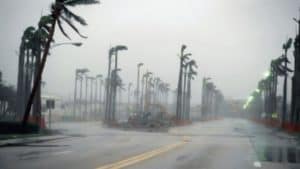Tips to Keep Your Tenants and Properties Safe During Hurricane Season

Here’s what you and your tenants need to know to keep calm in the chaos of severe weather, as well as what to do when a hurricane hits and your rental properties.
Before a Hurricane
While no one would likely choose to live through a hurricane, as natural disasters go, they have one advantage: forewarning. Luckily, you and your tenants prepare for these storms before they come through. As such, there are few things to keep in mind in the build-up to a storm to make sure your tenants and rental properties remain as secure as possible.
Know the Difference Between Watch and Warning
The amount of time you and your tenants have to plan/prepare depends on which one is issued. A watch gives you more time and usually means that the storm will arrive within 36 hours. A warning, however, only gives you about 24 hours. Be sure to get moving quickly if the latter comes along.
Brush Up on Your Insurance Knowledge and Encourage Your Tenants To Do the Same
As a landlord, you should double-check to make sure your landlord insurance covers flooding and any potential damage to the structure of the rental dwellings that could be caused by water or high winds. Do you know what you need in order to file a claim? Be sure to keep an inventory of the property for these purposes, as well as know what you’ll need in order to be covered.
And if you don’t include renters insurance as a condition of your lease – or even if you do – now would be a good time to send a friendly reminder to your tenants that your landlord insurance will not cover any damage to their personal belongings. Encourage your renters to review the terms of their renters insurance to make sure it covers any potential damage to their personal belongings due to floods.
Provide Instructions on How to Create an Emergency Kit
Most of the things your tenants need they probably already have on hand, but the trick is to make sure everything is in one place. That way when they need it, they can simply grab and go. In your communication with tenants, include tips for how to create an emergency kit, which should include things like non-perishable food items, water, flashlights and batteries, a battery-powered radio, cash, some clothing items, basic tools, and a first aid kit – just to name a few items.
During a Hurricane
While you can prepare to some extent for a hurricane, what you and your tenants do during the storm is also crucial to ensure their safety. No matter the severity of the storm, communication is key.
Encourage Tenants to Follow Directions and Evacuate if Necessary
If the area housing your rental properties is hit with an evacuation order, don’t ignore it! People often think that these are not as serious as they actually are, but it’s always better to be safe than sorry. Make sure all your tenants are aware of the evacuation, and actively encourage them to leave the property and seek a safer location. After all, no one wants to be stuck in an apartment when a hurricane does hit. But, if your tenants are…
Advise Tenants to Stay in Small, Windowless Areas
Recommend they stay in a bathroom, closet, or hallway on the lowest possible floor as their safest bet. The emergency kit they created previously will come in handy here, especially if the power goes out. If they have a battery-powered radio, they should to listen for updates on the storm, and try to remain as calm as possible.
Keep Tenants Up to Date
Let tenants know they can keep up with the storm on their phones (if they still have service) through the National Weather Service or listen for updates on the local radio station.
After a Hurricane
Once the hurricane has passed, communicate as needed with your residents to make sure they’re safe and to make sure they have all the necessary services (e.g. water and electricity) in the wake of severe weather. If their belongings have been damaged, for instance furniture, there are interim resources available that are often covered by their insurance – such as furniture rental – that they can utilize to ensure they remain comfortable as things get back to normal.
While hurricane season can be a stressful time everyone, with these tips, you and your tenants will be well-prepared to successfully weather the storm.
Source: rentalhousingjournal.com















 Accessibility
Accessibility